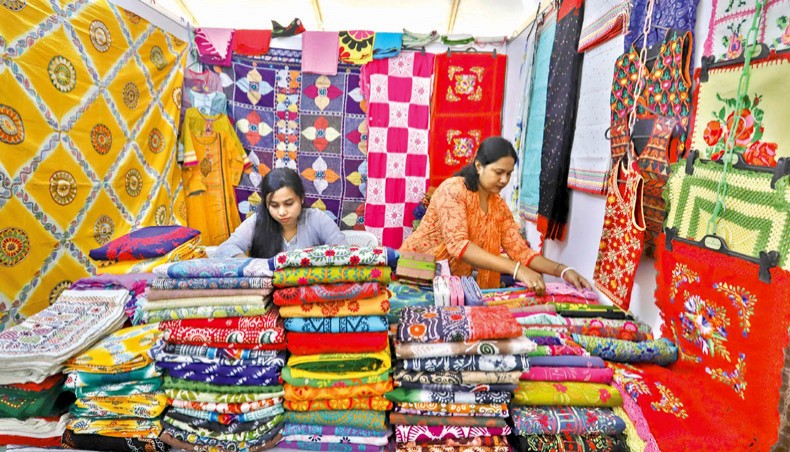A file photo shows two women organising products at a stall at an SME fair in the capital Dhaka. — New Age photo
Many small and medium enterprises in the country suffered tough challenges throughout 2023 due to increased production costs, rising inflation and difficulties in obtaining letters of credit for importing raw materials, businesses said.

They said that the SME manufacturing sector which accounted for nearly 25 per cent of the country’s gross domestic product borne the brunt of the ongoing economic woes in the country.
Ohidul Haque Shanto, proprietor of Chamra Bari, a business specialising in leather goods, lamented a decrease in both production and sales compared with those in the previous year.
He said, ‘In the previous year, we received five orders, whereas in 2023, we managed to secure only one order.’
He said, ‘Recently I have missed out on two orders due to escalating cost of production.’
He said that raw materials such as leather, dyes and solutions, essential for crafting leather products had become more expensive.
This surge in the prices of raw materials has significantly raised the production costs, he added.
He said that the importers of raw materials said that the increased import costs were a result of the difficulties encountered in opening LCs.
In January 2023, the general point-to-point inflation rate stood at 8.57 per cent, with food inflation at 7.76 per cent.
In November of the same year, the general inflation figure rose to 9.49 per cent and 10.76 per cent for food inflation, according to Bangladesh Bureau of Statistics data.
Jahirul Islam, proprietor of Shamima Silk House, a small business specialising in handloom saris, mentioned that in the past, they operated between 25 to 30 hand machines for sari production.
However, currently they are only able to run four machines.
He observed that the rising cost of living had led to increased wage demands from workers, consequently raising their production costs.
Moreover, due to this escalated cost of living, there has been a decline in customers as people’s purchasing power has diminished, he said.
Centre for Policy Dialogue distinguished fellow Mustafizur Rahman told New Age that different types of economic challenges had collectively impacted all forms of investments, with a greater effect observed in the SME sector.
He said that the increase in the prices of raw materials and the rise in the cost of doing business had disproportionately affected small and medium industries.
‘While they were just recovering from the Covid outbreak fallout, these challenges have hit small businesses harder, and their usual coping mechanism might not suffice in overcoming these problems,’ he said.
He said, ‘The SMEs that produce products for the local market and those who are involved in exports both suffered losses.’
They encountered various issues starting from the opening of LCs, he said.
While larger industries managed to leverage opportunities and banking facilities somewhat, procuring dollars at higher rates for material imports or opening LCs, smaller industries struggled to access the same, leading to increased hardships for them, Mustafizur said.
A total of 78,13,315 establishments within the SME sector, including cottage, micro, small, and medium enterprises and these establishments collectively engaged a workforce of 2,10,33,994 individuals, according to the Economic Census of 2013 conducted by Bangladesh Bureau of Statistics.
Out of the total establishments, 68,42,884 were cottage industries, 1,04,007 were micro enterprises, 8,59,318 were small enterprises and 7,106 fell under the medium category.
In terms of the workforce involved in these SMEs, 1,31,68,327 individuals were employed in cottage industries, 5,58,870 in micro enterprises, 66,00,685 in small enterprises and 7,06,112 individuals were engaged in medium-sized units.
















